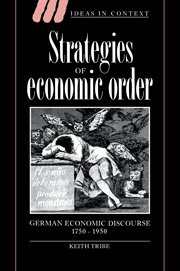Book contents
- Frontmatter
- Contents
- Acknowledgements
- 1 Introduction: From Cameralism to Ordoliberalism
- 2 Cameralism and the science of government
- 3 Die Vernunft des List. National economy and the critique of cosmopolitan economy
- 4 Historical Economics, the Methodenstreit, and the economics of Max Weber
- 5 The Handelshochschulen and the formation of Betriebswirtschaftslehre, 1898–1925
- 6 The Logical Structure of the Economic World – the rationalist economics of Otto Neurath
- 7 Capitalism, totalitarianism and the legal order of National Socialism
- 8 The genealogy of the Social Market Economy: 1937–48
- 9 The New Economic Order and European economic integration
- Bibliography
- Index
- Ideas in Context
4 - Historical Economics, the Methodenstreit, and the economics of Max Weber
Published online by Cambridge University Press: 14 September 2009
- Frontmatter
- Contents
- Acknowledgements
- 1 Introduction: From Cameralism to Ordoliberalism
- 2 Cameralism and the science of government
- 3 Die Vernunft des List. National economy and the critique of cosmopolitan economy
- 4 Historical Economics, the Methodenstreit, and the economics of Max Weber
- 5 The Handelshochschulen and the formation of Betriebswirtschaftslehre, 1898–1925
- 6 The Logical Structure of the Economic World – the rationalist economics of Otto Neurath
- 7 Capitalism, totalitarianism and the legal order of National Socialism
- 8 The genealogy of the Social Market Economy: 1937–48
- 9 The New Economic Order and European economic integration
- Bibliography
- Index
- Ideas in Context
Summary
It is generally supposed that ‘German economics’ in the later nineteenth century was synonymous with ‘the German School of Historical Economies’, a school whose most prominent headmaster was Gustav von Schmoller. Through this school there passed two generations of German economists. The first of these can be dated from Wilhelm Roscher's manifesto statement of 1843, and by all accounts includes just two other members: Bruno Hildebrand and Karl Knies. Schmoller was the leader of the Younger Historical School, the academic successor of the first group, and that with which Max Weber expressly associated himself. Historical Economics as an intellectual enterprise clashed dramatically with the new marginal economics of Carl Menger in the 1870s, providing the occasion for the ‘debate on method’ which was only indirectly resolved by the progressive international shift of academic economics away from a descriptive and inductive method towards theoretical and analytical argument. Conveniently for this understanding of German economics, the new economics that clashed with the Historical School was ‘Austrian’ in provenance, so that the conflict between historical and theoretical economics could be conveniently represented by a national, as well as an intellectual, boundary.
It is fair to say that, despite the evident crudities of this characterisation, it does reflect central elements of the image of German economics carried abroad by American and British students during the 1870s and 1880s.
- Type
- Chapter
- Information
- Strategies of Economic OrderGerman Economic Discourse, 1750–1950, pp. 66 - 94Publisher: Cambridge University PressPrint publication year: 1995
- 3
- Cited by

